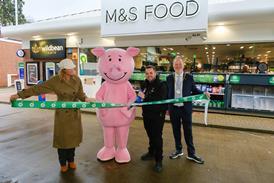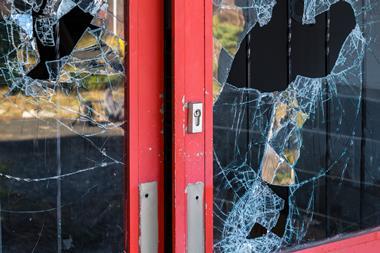Four C-Store Champions reveal how they plan for emergencies and the contingency plans they have in place should disaster strike
Mark Callaway, Bargain Booze Select Convenience, Salisbury, Wiltshire
Power surgers, which protect computers in the event of a power cut, are used at Mark’s store.
Kishor Patel, six Nisa stores across Bedfordshire and Hertfordshire
With two broadband contracts and a mobile dongle, Kishor is prepared if stores lose their internet connection
Vince Maloney, four Budgens stores in Berkshire, Buckinghamshire, and Surrey
A back-up chiller and walk-in freezer at Vince’s Shepperton store can house stock in the event of a failure.
Shaun Marwaha, three Premier stores in Glasgow
Rather than training staff for every eventuality, Shaun has hired an operations manager who is the first port of call for any difficult situations.
For what situations have you made contingency plans?
Mark: We’re too high up to be affected by flooding, but we are prepared for power cuts. We are also insured against break-ins and we have health & safety procedures in place for various situations.
Kishor: We look at all the situations that could affect our store and how high at risk they are. For example, flooding is a relatively low risk, although we did have issues recently with signs and roof tiles flying off in the strong winds.
Vince: We have contingency plans for everything from break-ins and how the weather might affect shopper demands, to how to save stock if there’s a power cut, or a chiller breaks. We employ 150 people so we also build in contingency plans around holidays and sickness.
Shaun: We have plans in place for power cuts, break-ins and equipment failures, and an experienced operations manager.
What are the key areas you need to protect?
Mark: Staff, IT, and stock.
Kishor: Our IT and broadband connections, our stock, our people and our finances - if you lose money then how will your suppliers and staff get paid. Speak to your accountant, so that you have contingencies in place to deal with these matters.
Vince: If a situation is dangerous to staff then they are the priority, but beyond that ensuring the stock is safe is very important.
Shaun: Stock, fixtures and fittings, the property, and staff.
How much do you plan for all eventualities, or how much do you just react when it happens?
Mark: All good operators will have taken the main risks into account. It’s all very well having contingency plans, but you need the appropriate insurance cover to protect your business.
Kishor: You can put prevention measures in place for some things, and for others it just happens and you have to deal with it. A lot of it is looking at what steps you can take to limit damage.
Vince: I’d say about 30% is reaction and 70% is planned responses, because we’ve been through some of these things through the years and put processes in place.
Shaun: You can only spend so much time on training manuals - a lot of your attention has to be focused on the here and now. We took on a retail operations manager last year and staff can contact him.
What plans have you made to ensure that your staff are prepared?
Mark: Staff are trained in health and safety procedures, for example if we had a fuel tanker leak the staff know to call for help and which switch to operate to close off the fuel and minimise risk.
Kishor: You can’t become complacent and rely on one key member of staff because, if an emergency comes up or they decide to leave, you need other people to be prepared as well. Your manager’s number two needs to be able to do most of the jobs that the number one does, and number three needs to know what number two does. We ensure that staff are transferable between stores as part of their contracts. Staff are also prepared for various situations, so if a freezer breaks down they are trained in how to deal with the stock.
Vince: We have a very robust procedure in terms of who staff need to call and what needs to be done in different situations. If you don’t plan, your insurance premium goes up and up.
Shaun: In our training policy there is all sorts of advice on who to contact in which circumstances, and we have maintenance guys who will come out in different situations. We also have the operations manager if they need further advice.
Are you heavily insured throughout the business, or covered for certain events?
Mark: We are comprehensively insured for high-value goods and cash. You can’t stop a person who is determined to come in and steal money. However, they will come in in advance and check out our security. Having CCTV coverage and till drop procedures in place will hopefully deter them.
Kishor: We are insured quite well. An obvious mistake that retailers make is to go for the lowest quote, but insurers are clever and put get-out clauses in to make it cheap, so you have to check the small print. We’re in the process of making sure our insurance policies are verified by an independent expert to ensure we have enough cover. We were looking at if someone smashes in your front window - fixing it involves replacing the glass, the alarm connection, the fascia, the lighting connected to it, the shutters and signage. That could all add up to £20,000, so if your shop front is only insured for £5,000 you won’t be fully covered.
Vince: We’re covered for everything - even tribunals for staffing issues. It’s good to have something in place just in case.
Shaun: We are highly insured. Most businesses probably don’t adequately insure. We have the broker come to our site regularly and we run through stock control and make sure we are accurately insured for at least the minimum of the survey value.
What plans do you have to ensure your stock is protected?
Mark: Insurers aren’t worried about how many packs of cornflakes you have as these are low value, but you have to know how much your total alcohol stock is worth and slightly over-insure. We have our general grocery, ambient and confectionery products insured, and insure our chilled goods.
Kishor: We always look at the highest risk stock - such as cigarettes and scratchcards. You have to be covered for all eventualities, and look at the policy’s fine print.
Vince: You have to insure stock under ambient, frozen and chilled categories. In terms of power cuts, we have a procedure to move all the stock to back-up chillers in other stores. You can claim on insurance, but it will just push up the premium, so it’s better to prepare. In summer, the chillers can over-heat, so again we’ve had to make plans to protect the stock in back-up equipment.
Shaun: We have weekly stock-taking rotas for high-value goods and the whole store is done every three months. It keeps our figures accurate.
When did your contingency plans last come into play?
Mark: When we had a power cut two or three weeks ago; we lost power for half-an-hour.
Kishor: The broadband went down at Houghton Regis and Toddington five or six months ago. We also had a freezer go down.
Vince: Shepperton became really busy because of the flooding. We had to bring in extra staff to fill the shelves. People couldn’t get to the multiples and we wanted to provide them with a good service.
Shaun: We had a break-in in February 2012. We had just bought the unit and were intending to enhance the security, but we wanted to do it at the same time as the refit, which was scheduled for a week-and-a-half’s time.
How effective were your contingency plans?
Mark: Although we lost our lighting in the power cut, it was the middle of the day, so there was enough daylight for people to shop and the till battery kicked in. It’s not that we would have lost a massive amount of money in that time, but it’s about giving customers the convenience and consistency that they want.
Kishor: We got the dongle in place in less than half-an-hour, so it does work. It was the same with the freezer - staff knew what to do and we didn’t lose any stock. We rarely have any insurance claims because we are prepared.
Vince: It was a bit chaotic getting the extra staff in place, but it did work. We employ a lot of part-time people whose hours we could extend, which enables us to be flexible.
Shaun: We were caught with our trousers down and the thieves got away with a lot of stock, but we were insured.
How have you learnt from this and altered your contingency plans?
Mark: We were fully prepared so the power cut didn’t affect us.
Kishor: We are working to reduce the amount of freezer breakdowns. We have automatic temperature recorders, but now we’re going to collate our real-time data in one place so that we can monitor it on a weekly basis and spot any patterns.
Vince: We’ll be keeping an eye on the weather and be prepared if the flooding happens again. We’ll make sure we get to the shop earlier next time as after 8am the roads were jammed. We’ll also have a better idea of which products to expect increased demand for. What sold really well during that time was bottled water, so the first thing we would do is stock up on that.
Shaun: Being broken into really drove home the fact that security has to be top notch. Going forward, any stores that we take on we focus on security first.
What plans have you put in place to ensure that your computer data is protected?
Mark: Without IT we couldn’t serve customers or do orders so we have a full back-up system and a maintenance contract that will give us priority if the site went down. In addition, tills are fitted with surge protectors.
Kishor: We have a back-up battery for the main server so that it doesn’t just switch off if there’s a power cut. It lasts about three or four hours, so you can shut down safely. The biggest contingencies we have are two broadband connections at our head office, one with O2 and one with Plusnet. If one goes down, our system automatically switches to the other. If they both go down we have a mobile dongle that you can just plug into a router. The dongle can be used by any of our stores, for example if the broadband goes down in our Hemel Hempstead store we can get it there in 20 minutes.
Vince: All our stores’ data is backed up on a server. We’ve invested in handheld wireless terminals - there’s one in each store, so that if the broadband goes down we have a plan b.
Shaun: We have surge protection units that plug into the electrical systems and regulate the voltage, so if there is a spike our systems are protected. It also retains power, so it allows us time to shut down computers in the event of a power failure.
Where can retailers get advice on creating their contingency plans?
Mark: Go on the internet and look up ‘risk assessment’ or ‘power cut preparation’ and there will be plenty of advice on how to prepare. You could get it all set up in an hour.
Kishor: A lot of it is just doing the work yourself. But if you need help with IT and broadband then speak to a specialist in that area. If it’s to do with electricity then speak to an electrician for advice.
Vince: As well as your symbol or wholesaler, you can talk to the Association of Convenience Stores and local councils - they’re very good at giving advice.
Shaun: It’s good to go out and speak to different retailers. Last year we met lots of different single and multi-site retailers to see how they operated. Booker also has an online forum where you can put up a direct post on contingency planning and get advice from other Premier members.




















![C-Store_Champions_logo-CHOSEN[1] 2023](https://d2dyh47stel7w4.cloudfront.net/Pictures/380x253/6/5/7/301657_cstore_champions_logochosen12023_817064.jpg)




No comments yet